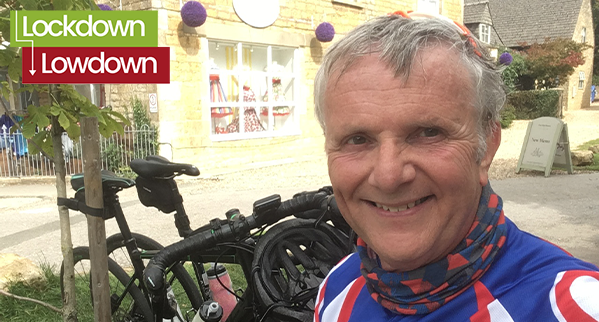Air Vice-Marshal Ray Lock CBE is Chief Executive of Forces in Mind Trust (FiMT), a charity whose mission is to enable ex-Service personnel and their families to make a successful and sustainable transition to civilian life. Forces in Mind Trust is one of our clients. We work alongside public affairs specialists at BDB Pitmans on a strategic communications brief.
A force to be reckoned with
Louise: Working with FiMT and Cobseo (the Confederation of Service Charities), we have spoken to veterans whose response to the Covid-19 crisis has been an inspiration. The media has focused on the contribution of those still in the Armed Forces (for example in building the Nightingale Hospitals), rather than that of ex-Service personnel. Do you feel that veterans, in general, are undervalued in our society?
Ray: If you ask people what they think of when they hear the word ‘veteran’, it’s usually someone like Captain Sir Tom. Elderly, wearing a blazer with a string of medals, rheumy-eyed remembering fallen comrades, probably a beret too. And yes, I think Society does recognise what this generation of people have done. But most veterans don’t fit that stereotype nowadays – if you saw me walking down the High Street for example, I would be indiscernible from every other civilian (which is what I am). Some employers understand how military service enhances an individual’s qualities, some don’t and they’re the ones missing out. Veterans don’t want to be continually thanked ‘for your service’ as they are in the States. Veterans just want the opportunity to fulfil their potential, so it is a societal undervaluation, but perhaps different to how you would imagine.
The majority of people leaving the Forces do so successfully, but a minority face challenges – with employment, housing, finance, relationships or mental health. The Government says it will make sure the UK is the best place to be a veteran anywhere in the world. FiMT commissions research to inform policymakers, but the decision-making process can take time. If you had the power to change one thing right now, what would it be?
Such a great question, and every time I get into a politician’s office I try and have an answer to that ready. We know that if you fix employment, then housing, finance, relationships, health – pretty much every other aspect of successful transition follows. The next couple of years though are going to be hell for everyone trying to get into a sector for the first time. So I would make all serving people work in a civilian workplace for a fortnight once a year throughout their military career, and force every employer to spend a week somewhere in the Armed Forces. Impractical perhaps, but you can see why it would help, but without legislating to confer unfounded advantage which would be terribly divisive.
As well as politicians, you work with Armed Forces charities to improve effectiveness and build capacity. You have written about the importance of collaboration and greater investment in leadership development. What can charities from all sub-sectors learn from the Armed Forces community in terms of teamwork, effective leadership and impact?
“There’s a bit of a misperception that military charities are all led by retired generals. Some certainly are, but Help for Heroes, the Royal British Legion, Combat Stress – their Chief Executives have never worn a uniform, and they’re incredibly talented leaders of three of the most important charities in my sector.”
That said, there’s definitely a military feel about most Armed Forces charities, and a real sense of unified purpose permeates throughout organisations which makes collaboration a lot easier. The UK Armed Forces also have a doctrine of ‘mission command’, where leaders tell their team what they have to achieve, but not how. There’s a version of it taught in every business school because it’s a great way to empower your team and to ensure they make an impact by applying their better understanding at that level. It’s the best way to encourage innovation. Not everyone can do this; but being out on a mission, far away from home, alone with your team and out of contact with anyone else, possibly in enemy territory and probably afraid, that’s when mission command becomes deeply embedded in your DNA.
You held senior positions in the Royal Air Force before joining FiMT as Chief Executive in 2012. What were the main challenges for you in adapting to the voluntary sector’s culture and ways of working? Did you have to significantly alter your leadership style?
One of the great pleasures of joining the voluntary sector has been working with such a diverse bunch of people, and I mean diverse in the very broadest sense – thought, approach and culture, as well as the more traditional ‘DEI’ aspects. I joined the RAF in 1977, when homosexuality and pregnancy would lead to your being forced to leave, and people of colour (not that we used that expression then) were few.
I like to think I’ve changed over the decades, as I do truly value every individual human; but I recognize that I wouldn’t win a ‘woke’ contest with my three 20-something children.
I was lucky that when I left the RAF I’d spent almost 10 years at the Defence Academy, with its mix of military students (ambitious, inquisitive, fiercely critical), a civilian service provider (KPI fixated, and margin driven), and an academic provider (intellectually inspirational, but utterly incapable of sticking to time!). My leadership style had to adapt – but also experience brings wisdom, and age takes the harmful edge off ambition. It helped that in an idle moment I took up rugby refereeing. Living in Gloucestershire, which is renowned for producing a particularly ‘robust’ type of player, making sure that 30 grown men play a very physical sport in a controlled way demands yet another approach. I might not be the greatest judge, but I don’t feel I’ve had to change much, it’s more a question of having a pretty large leadership toolbox.

